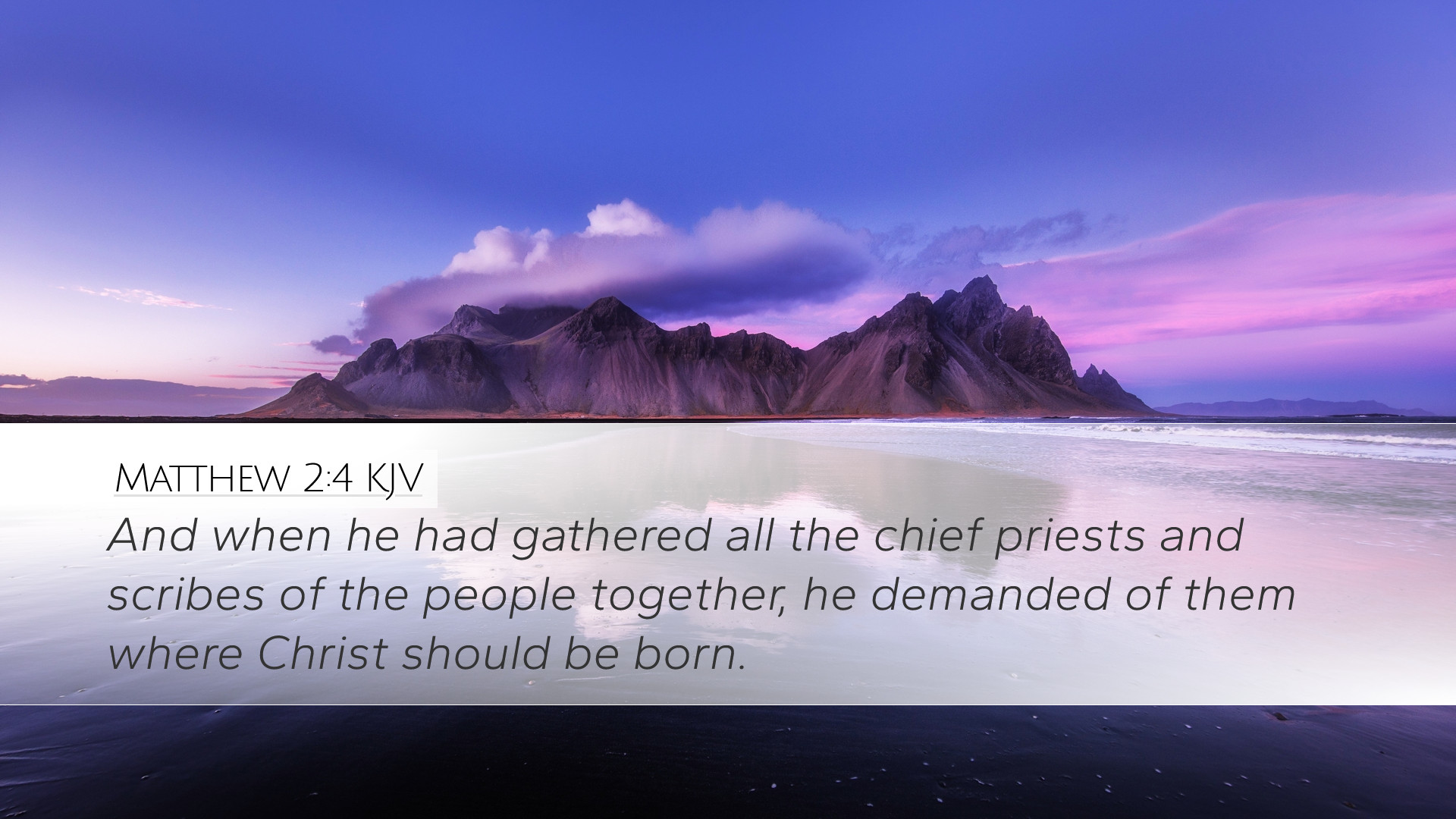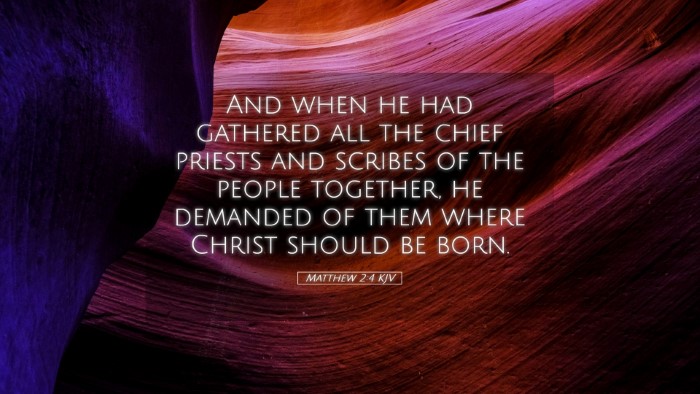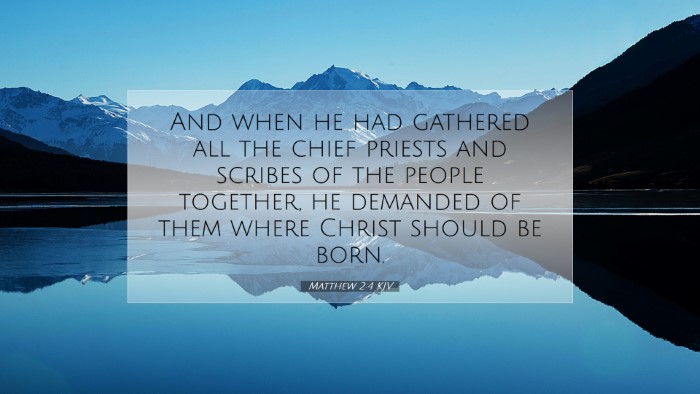Commentary on Matthew 2:4
Verse Text: “And when he had gathered all the chief priests and scribes of the people together, he demanded of them where Christ should be born.” (Matthew 2:4, KJV)
Introduction
The significance of Matthew 2:4 emerges in the broader narrative of Jesus's early life, especially in the context of his birth and the responses it elicited from various groups in Judea. This verse illustrates Herod's inquiry about the birthplace of Christ, revealing the interplay between earthly powers and divine purposes.
Commentary Insights
Herod’s Gathering of the Religious Leaders
Herod, the King of Judea, is intrigued by the news of the birth of the "King of the Jews" as expressed by the Magi (Matthew 2:2). His immediate response underscores his insecurity and tyrannical character. He gathers the chief priests and scribes to seek clarity on prophetic writings concerning the Messiah.
Matthew Henry’s Perspective
Matthew Henry highlights Herod's preoccupation with his power and dominance. His gathering of the chief priests and scribes exemplifies a political maneuvering typical of tyrants who feel threatened. Henry notes that Herod’s inquiry was not out of genuine curiosity but rather a calculated move to consolidate his position.
Albert Barnes’ Commentary
Albert Barnes elaborates on the role of the chief priests and scribes as the recognized religious authorities. He asserts that their knowledge of the Scriptures made them the crucial link between prophecy and reality. Barnes emphasizes their subsequent revelation of Bethlehem as the prophesied birthplace, echoing Micah 5:2, alluding to the prophetic expectation surrounding the Messiah.
Adam Clarke’s Analysis
Adam Clarke provides an overview of the historical implications of this gathering. He notes that the chief priests and scribes were not only aware of the scriptures but were also embedded in the socio-political landscape of Judea. Clarke emphasizes the irony that the spiritual leaders failed to respond with enthusiasm to this divine revelation, representing a broader theme of neglecting God’s promises.
The Prophetic Fulfillment
The inquiry of Herod leads to a significant theological realization about fulfillment. The prophecy concerning the Messiah's birthplace speaks volumes about God's foreknowledge and the meticulous unfolding of redemptive history.
Matthew Henry's Reflection on Prophecy
Henry suggests that the specificity of the prophecy serves as a reinforcement of God's sovereignty. The fact that the magi seek Jesus based on a star and that the religious leaders know the prophecy illustrates the convergence of the secular and sacred and the fulfillment of God's promises throughout history.
Albert Barnes' Emphasis on Prophetic Assurance
Barnes emphasizes that the prophecy from Micah reaffirms God’s control over the course of human events. The confirmation provided by religious leaders to Herod, albeit with indifference, highlights their acknowledgment of the scriptural authority while neglecting to act on its implications.
Adam Clarke’s Commentary on Prophetic Implications
Clarke elucidates the profound depth of Israel’s history weathered through prophecies. The birthplace of Christ being in Bethlehem, a city of David, connects the messianic lineage to God’s covenant with David, thus fulfilling ancient promises recorded in the scriptures.
Error in Not Recognizing Christ
The indifference displayed by the chief priests and scribes can serve as a warning for contemporary religious leaders and scholars about the consequences of spiritual apathy.
Insights from Matthew Henry
Henry clarifies that the failure to act upon knowledge leads to missed opportunities for transformation in faith. The dread of losing power kept Herod and the religious authorities from embracing the truth laid before them.
Albert Barnes on Leaders' Indifference
Barnes posits that the mere awareness of Bible prophecy without a heart-response is a pitfall for faith leaders today. The scribes, custodians of scripture, remained passive. This serves as a cautionary tale about the importance of not just knowledge but an active engagement with the truth of the Gospel.
Adam Clarke’s Warning to Modern Leaders
Clarke stresses that the account invites modern-day leaders and theologians alike to examine their hearts. He poses a reflective question: do we, like the scribes, possess knowledge of God’s Word yet fail to recognize the implications of Christ in our midst?
Theological Implications
This verse invites rich theological discussion, particularly concerning the nature of God's revelation and the human response to divine truth. How individuals and leaders respond to the revelation of Christ has profound implications for the church's mission and the integrity of its witness.
Matthew Henry: The Nature of God’s Revelation
Henry points out that God's revelation comes in various forms—through prophecies, events, or individuals—and yet often goes unacknowledged. This necessitates a posture of vigilance and openness to the workings of God in the world.
Albert Barnes on Christ’s Arrival
Barnes concludes that Christ's arrival was not only the answer to the prophecy but also a challenge to the authority of earthly rulers. The acknowledgment of Christ’s lordship is a vital aspect of the Christian faith that beckons an active, responsive heart.
Adam Clarke on Human Response
Clarke’s insights lead the reader to consider how different beings—magi, Herod, scribes—respond to God's revelation. He prompts the audience to evaluate their spiritual readiness and receptivity to Jesus' lordship over their lives.
Conclusion
Matthew 2:4 serves as a critical juncture in the narrative of Christ’s birth and the spiritual landscape of Israel. It encapsulates themes of prophecy fulfillment, the responses of human authorities to divine revelation, and the theological implications for personal faith and corporate church life.
As students, pastors, and theologians reflect upon this verse, they are reminded of the importance of recognizing and responding to God’s initiatives in the world. The indifference of the religious leaders serves as a stark reminder that knowledge alone does not equate to faithfulness; active engagement with the truth is essential for a transformative relationship with the living Christ.


